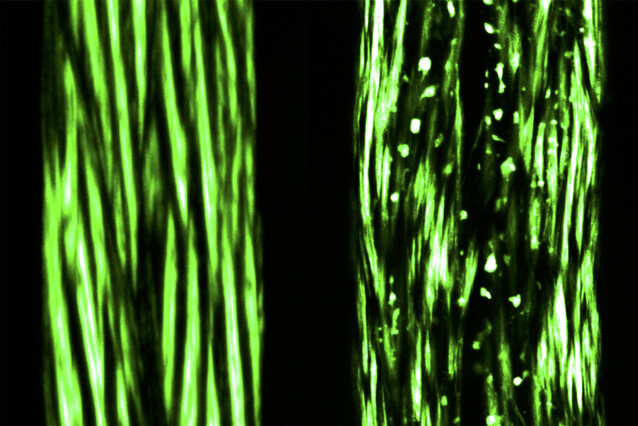Tim Clausen among Allen Distinguished Investigators 2022

The Paul G. Allen Frontiers Group has announced its 2022 selection of Allen Distinguished Investigators. Among the selected researchers is IMP Senior Scientist Tim Clausen, for a collaboration with Janine Kirstein (University of Bremen).
As announced by The Paul G. Allen Frontiers Group, a division of the Allen Institute in Seattle (US), a collaboration between IMP senior scientist Tim Clausen and Janine Kirstein of the University of Bremen (Germany) was selected for the Allen Distinguished Investigators 2022.
In their project, Tim Clausen and Janine Kirstein seek to build a “protein lifespan” kit to track the life cycle of a single protein in a living organism.
Just like human beings, a protein's lifespan depends on its primary constitution, education, neighbourhood, and environmental factors. Similarly, the healthy ageing of a protein is extremely important to avoid premature misfolding and aggregation, associated with severe diseases called proteinopathies, such as Alzheimer’s disease or certain myopathies, disorders caused by muscle fibre defects. The lifespan of a protein can be defined as the time from when a newly synthesized polypeptide chain starts to fold, through the assembly into larger protein complexes, to when the protein is degraded, often after it has lost function.
While we know a great deal about these individual steps from experiments in the test tube, we know little about how they are coordinated in complex living animals. For example, why do some proteins live for a long time whereas others turn over rapidly? And what cell conditions affect their folding and degradation? Currently, it is not possible to track the entire lifespan of a protein in a living animal due to the lack of reporting tools that cover the folding and maturation stages.
To overcome this bottleneck, the groups of Kirstein and Clausen will team up to pioneer a special fluorescent tag to monitor the maturation, ageing and degradation of the muscle protein myosin. Experiments will be carried out in cell culture and later in the nematode worm C. elegans. The scientists will also track the fate of mutated versions of myosin, known to cause neuromuscular diseases in humans. By live-tracking these troublemaker proteins in a living animal, the group aims to better understand how protein misfolding, premature damaging, and other aspects of protein lifespan might play a role in muscle diseases and organismal ageing.
“I am very excited that our project was selected,” says Clausen. “The support of the Allen Distinguished Investigator programme allows us to address an extremely ambitious project, aiming to track single proteins in a living animal. We will soon look for students and postdocs to join us in this adventure, addressing the impact of protein lifespan on organismal ageing.” The relevant positions will be advertised through the IMP website in due time.
About the Allen Distinguished Investigators
The Allen Distinguished Investigator programme supports early-stage research with the potential to reinvent entire fields. It gives grants between one and 1.5 million US Dollars to individuals and scientific teams with the intention to boost momentum in the relevant research area. The impact of the programme, however, goes far beyond pure research funding; it also promotes visibility and scientific collaboration among those few researchers who are selected.
The Allen Distinguished Investigator programme was launched in 2010 by the late philanthropist Paul G. Allen to back creative, early-stage research projects in biology and medical research that would not otherwise be supported by traditional research funding programmes. To date, a total of 130 Allen Distinguished Investigators have been appointed. Each award spans three years of research funding.
According to the programme’s website, “Allen Distinguished Investigators are passionate thought leaders, explorers and innovators who seek world-changing breakthroughs. […] What the Investigators share is a pioneering spirit, the ability to imagine possible futures of science, and the ability to create new ways of thinking to share with the world.”
Further Reading